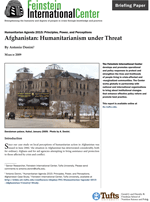Based on extensive field interviews in Afghanistan, this briefing paper is an update of a 2006 study on perceptions of humanitarian action in Afghanistan, which was part of the Humanitarian Agenda 2015 research program. The paper highlights critical issues affecting the provision of humanitarian action and suggests how they could, partially at least, be redressed.
Building on data collected through interviews in the aid community as well as with ordinary Afghans, the briefing paper finds that humanitarianism is under deep threat in Afghanistan because of the perceived association of aid agencies with the US-led intervention. Humanitarian actors and the principles they profess are under attack. The ability of humanitarian agencies to address urgent need is compromised by internal and external factors, i.e., both by the organization and modus operandi of aid agencies on the ground, and by an extremely volatile and dangerous operating environment.
The aid community in Afghanistan faces severe challenges that need to be urgently addressed so that civilians in need can be protected and assisted and the credibility of the humanitarian enterprise restored. Opportunities for more principled humanitarian action, by separating or insulating it from political and military agendas, should not be missed. Failure to do so will have dire consequences for Afghans and for the future of humanitarianism worldwide.







